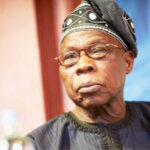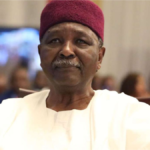Former President Olusegun Obasanjo wrote to the chief clerk of the Central Criminal Court, Old Bailey, in London, last month, pleading with the court to temper justice with mercy in respect of Senator Ike Ekweremadu and his wife, Beatrice. They were tried and convicted by the court on charges of organ trafficking and are awaiting sentencing by the court. Obasanjo’s letter was an unprecedented step with, I believe, a genuine feeling and purpose.
Ekweremadu’s case is sad, unfortunate, and pathetic. He and his wife were arrested in May last year by the Metropolitan Police and eventually “charged with conspiracy to arrange/facilitate travel of another person with a view to exploitation, namely, organ harvesting.”
No parent who has followed their dramatic change of fortune from important people to prisoners would fail to be touched by their trauma, their ordeal, and their plight. There is no contesting the fact that Ekweremadu and his wife broke a British law on modern slavery, but neither he nor his wife is a criminal in the business of organ harvesting or trafficking.
As parents, they were faced with the health challenges of their daughter who needs a kidney transplant. They were duty bound by their moral and sacred parental responsibilities to take whatever steps they deemed necessary, within the law, of course, to save the life of their daughter. All responsible parents would do the same to save their ailing child. That they took what they believed was the right step, but which turned out to be a wrong step, does not make them criminals. Still, they have to pay the price for their error of the heart before the law.
The senator and his wife did not go into this with a criminal intent. Ekweremadu, a lawyer, failed to see that while organ donation is not illegal in Britain, it is illegal to pay or seek to pay for it. He and his wife believed that the young man they took to London was a willing donor not a seller of his precious organ. They were mistaken on two counts. One, they took a young man who is smarter and had his own agenda before he left Nigeria for Britain. Two, they acted like the privileged Nigerians they are, to wit, their privileged position means they can get whatever they want, including possibly using their wealth to buy a cold spot in hell.
The Nigerian government feels indifferent to what has befallen the senator and his wife. It obviously dismisses them as criminals who must bear their own cross. It has left them to stew in what the government regards as their criminality. It was this apparent indifference on the part of the federal government, I think, that motivated Obasanjo, the famous Letter Man, to borrow from the title of Musikilu Mojeed’s engaging book on him, to take this rather unusual step of writing a letter to the court to plead for mercy on behalf of the senator and his wife. I am willing to believe that he acted with the best of intentions towards a fellow Nigerian.
It is not right for the federal government to treat Ekweremadu like a common criminal who deserves his comeuppance. I do not suggest that he is above the law. He could be above the law here but certainly not in Great Britain where the law and the of rule are treated with respect, not with arrogant contempt and impunity.
Ekweremadu was deputy senate president for 12 years, and, therefore, a major player in our national politics. He is no longer in the senate but his role as a political leader in and out of the legislative chambers cannot now be sacrificed on the altar of the step he took to save his daughter’s life, but which turned out to be an illegal step. He failed to observe the thin line that divides organ donation from organ purchase. Some people condemn him as an exploiter of the poor boy who would be willing, for the right price, to sell his organ to survive. It was a grievous error and grievously he and his wife are paying for it – with the added problem that their daughter’s health challenge remains a challenge while they face the dark prospects of a long stretch in prison.
I know that being Obasanjo, his letter will be treated as an interference with a case that does not concern him by those who resent his every word and every attempt to make his contributions to how we are governed and how we ought to be governed. I do not hear the sound of chest beating here. I hear the plea of a concerned senior citizen for a fellow citizen who ran afoul of the British law.
The more important point Obasanjo sought to make in his letter, considering that he properly introduced himself to the clerk as a four-star general, a former military head of state and a former president, is that the Nigerian government has been negligent or remiss or both in abandoning the former deputy senate president and his wife to their fate. In other words, he is making the plea for mercy as an important and responsible military and civilian leader who knows that although the law is no respecter of persons, the end of law is the administration of justice. The administration of justice is punitive, but it is also more importantly rehabilitative and reformative, hence the decision to change the name of the Nigerian Prison Service to Nigerian Correctional Services. The Nigerian government cannot be indifferent to the fate of its citizens anywhere in the world.
Obasanjo believes, and I share in that belief, that the Nigerian state has a duty to protect its citizens anywhere in the world and where necessary, save them from the kind of trauma and ordeal that Ekweremadu and his wife are going through. He has raised his voice in the defence of a responsible Nigerian who mistakingly stepped outside the law in his eagerness to save his daughter. What Obasanjo tried to do through his letter to the court ought to have been undertaken or explored through the diplomatic channel between the Nigerian government and the British government.
I have argued here and elsewhere that patriotism is reciprocal. Citizens reciprocate their fair treatment in the hands of the state with unalloyed loyalty to the state. The Americans know this more than any other nations on earth. American citizens, including those who break the law in other countries, enjoy the protection of the American state anywhere in the world. American citizens know that their government always has their back. It is the way to cultivate patriotism and make citizens believe in and trust their government.
Our country does not have the economic and military muscle to have its way like the Americans, but the diplomatic channels are available as forums for nations to talk friendship and cement friendship for their mutual interests and to benefit their respective citizens. It is a path the Nigerian government ought to have taken in this case out of the klieg lights of the mainstream and the social media attention. Ekweremadu broke the British law, but he and his wife are not criminals. They are a desperate couple trying to do what they could to save their daughter’s life. The law is right to frown at it, but the court would be wrong to stick to legalism and not temper justice with mercy.

 Join Daily Trust WhatsApp Community For Quick Access To News and Happenings Around You.
Join Daily Trust WhatsApp Community For Quick Access To News and Happenings Around You.

